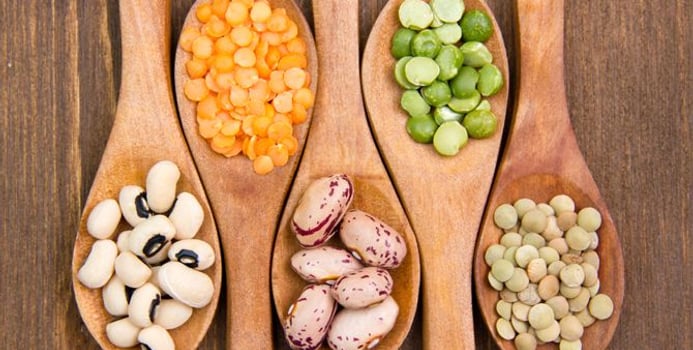Beans add nutrition to the diet to promote good health and bodily functions. They're low in fat, high in protein and fiber, and contain a multitude of vitamins. Beans are a wonderful alternative to meat, are good sources of energy and should be a staple in the daily diet to encourage and develop proper health and nutrition. Here is what you should know about bean nutrition.
High Protein Content in Beans
Beans are very high in protein, which can be a wonderful substitute to animal protein. One cup of beans can contain anywhere from five to 23 grams of protein, depending on the type of bean. Protein is necessary for the growth and repair of cells, and building strong structures in the body. Protein from beans helps make up enzymes that the body uses to make biochemical reactions occur in the body.
Beans Are High in Fiber
Beans provide fiber necessary for proper bowel movements and digestion. One cup of beans contains about 12 grams of fiber, which accounts for almost half of the daily required fiber recommendations. The fiber content in beans allows them to be digested slower, which helps a person maintain a feeling of fullness and counter hunger.
Beans Lower Cholesterol
Consuming as little as half a cup of beans per day can help a person lower their cholesterol levels. Beans contain lecithin, which can help to reduce cholesterol in the blood. The fiber content in beans also binds cholesterol together and excretes it efficiently with waste.
Source of Antioxidants
Beans are a wonderful source of antioxidants, which help to counter the effects of carcinogens in the diet and environment. Antioxidants are disease-fighting compounds that help our bodies stay healthy by building the immune system. Studies have shown that a variety of different beans contain high levels of antioxidants to promote good health.
Prevention of Diabetes
Diabetes can be controlled and prevented with regular consumption of beans. Research suggests that beans can lower blood glucose levels, thereby reducing the incidence of type-2 diabetes. Since they are digested slowly, beans stabilize blood sugar levels, which helps to prevent the onset of diabetes.
Rich in Iron
Beans are very high in iron, which is a mineral that helps transport oxygen to our cells. Iron is also important for muscle protein and development. Iron can help fight the development of cancer, boost energy levels, strengthen the immune system and encourage restful sleep. Beans have about 5 milligrams of iron per cup, which is more than half of the recommended dosage for the average adult. Consuming an adequate amount of beans on a daily basis can provide all the iron necessary for the body.
Rich in Other Vitamins
Besides iron, beans are also valuable sources of a variety of necessary vitamins and minerals, such as:
- Vitamin A
- B Vitamins
- Vitamin C
- Potassium
- Niacin
- Riboflavin
- Calcium
A diet rich in vitamins and minerals is essential to promote good health. The nutrition in beans can provide many of the dietary requirements necessary for proper health.



